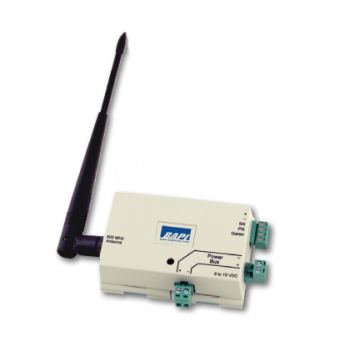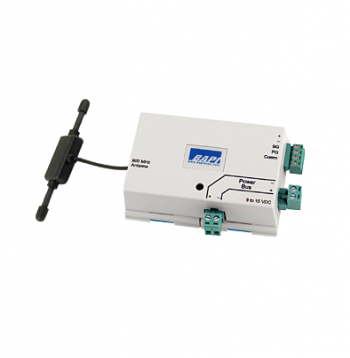
With the many types of wireless sensors available today, finding the perfect sensor for your needs can get confusing. This is especially true for technicians that are new to the trade! Have no fear, Industrial Stores is here to answer all of the questions you should be considering when purchasing a wireless sensor.
What Is A Wireless Sensor?
Before we can dive into the specifics of wireless sensors, we need to make sure you know what they are first! A wireless sensor is a monitoring and recording device that can send data directly through wireless links.
Technicians must ensure that their wireless sensor is giving accurate readings, which is why finding a responsive and reliable sensor is essential for the job!
Search for accurate and responsive sensors like the BAPI Temperature Sensor below.

How A Wireless Sensor Works
A wireless sensor has three main components. The sensor, the gateway, and the user interface. You might be asking yourself…what the heck is a user interface?! To answer your question, a user interface is a software program that allows you to interact with the data you record.
Wireless Sensor Networks, or WSNs are composed of various sensor nodes that sense changes in the environment like temperature, pressure, or humidity.
Watch this great video by PhaseIVEngineering to learn more about how wireless sensor networks work.
6 Questions Technicians Ask About BAPI Wireless Sensors
It is important for technicians to research the temperature accuracy of a wireless sensor before they purchase it. For example, Industrial Stores sells BAPI sensors, which are known for their reliability. Below is a list of 6 important questions technicians need to know about BAPI Wireless Sensors. If you wish to read more in depth application notes, you can do so on BAPIs Wireless Sensor FAQs.
1) I don't understand the difference between an SMA connector and RP-SMA connector?!
Some technicians get confused about what makes SMA and RP-SMA connectors different from each other. We’re here to help explain it to you!
BAPI explains that SMA, or SubMiniature Version A connectors are coaxial RF connectors. Which is a minimal connector interface used for coaxial cables that have a screw type coupling mechanism. SMAs offer excellent electrical performance from DC to 18 GHz!
On the other hand, RP-SMA connectors are more commonly used for commercial (RP-SMA) equipment. They are used to help prevent both unintentional OR intentional connection of high-gain professional antennas (with SMA connectors) to commercial wireless equipment (with RP-SMA connectors), violating federal or international laws.
2) What on earth does “interval dither time” mean?
BAPI explains that “Dither” is a term used to describe the slight change in interval time before the next transmission. Each time a transmission is complete, the next transmission will start at the programmed interval time with an additional, randomly selected dither time. This way each transmitter won’t be synchronized with another transmitter.
3) Can you tell me the frequency control for BAPIs FHSS radio?
The frequency control for the FHSS radio on BAPIs wireless sensors is Direct FM.
4) Does the temperature transmitter send a transmission on a fixed differential temperature?
Nope! BAPI’s wireless sensors will only send a transmission at normal intervals. (Every 20 to 21 seconds).
5) Does the override contact transmit IMMEDIATELY if it's pushed?
100% YES! BAPI wireless sensors will also transmit one second later to double the probability that the transmission will be received!
6) What FCC regulations cover the BAPI wireless sensors/transmitters?
BAPI claims that their wireless equipment is covered under FCC Part 15; specifically, subpart C. Click to read the FCC document that contains more information about the regulations covering BAPIs wireless equipment.
Let’s Get You The Wireless Sensor You Need Today
Here at Industrial Stores, our expert staff are well-equipped to help you find the best wireless sensor for your needs. We will also source the right unit for you, get you reduced prices, and deliver the unit to you quickly and safely.
Shop for wireless sensors at Industrial Stores today to discover the best prices.
 What Others Said About Industrial Stores
Our happy customers love our friendly service, fast shipping, and comprehensive inventory.
What Others Said About Industrial Stores
Our happy customers love our friendly service, fast shipping, and comprehensive inventory.
Some of the compliments and positive reviews that come up most include:
- Service beyond the obvious, always ensuring customer satisfaction
- Fast and convenient shipping with order tracking, giving you peace of mind
- Cost savings by finding you more affordable alternatives
"Thank you so much for your hard work and concern, really appreciated."
— Luis S. Valverde, Thermo Air Inc., Hollywood, Florida
"I couldn't be happier to have saved hundreds of dollars."
— Ruben Marquez, Madison, WI 53711
"I have the part, it was here early AM - THANKS SO MUCH."
— Teresa Browder, Oak Farms Dairy, Houston, Texas

895a5c59ef17c275137dd7b3877a0a0b6f5c67713f85b6b81c3fbf464269a32e



